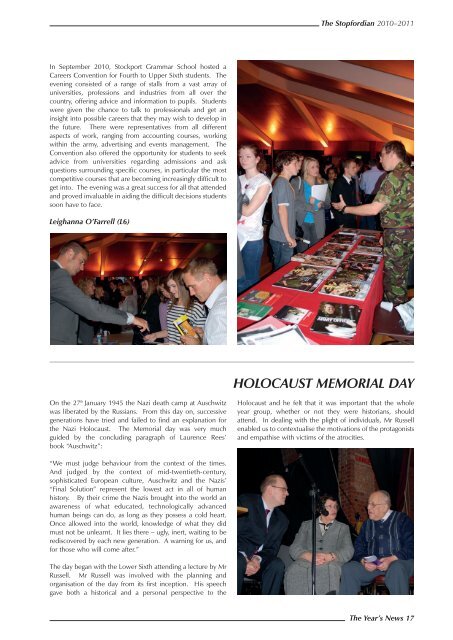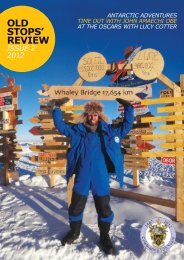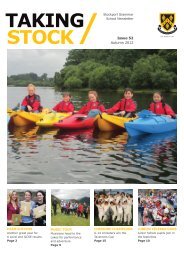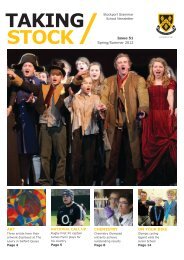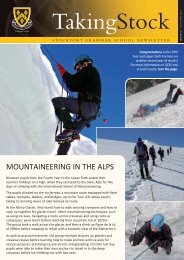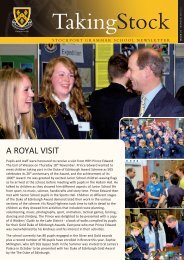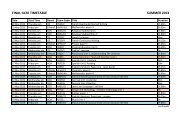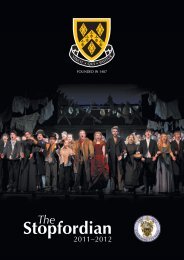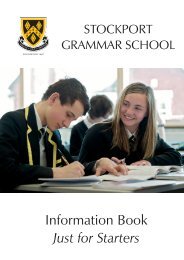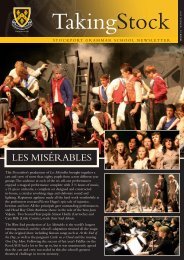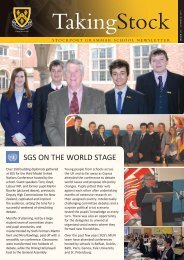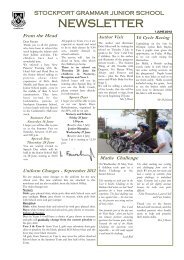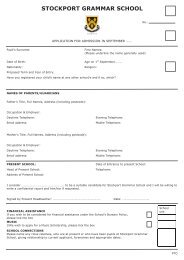Stopfordian 2010â2011 - Stockport Grammar School
Stopfordian 2010â2011 - Stockport Grammar School
Stopfordian 2010â2011 - Stockport Grammar School
Create successful ePaper yourself
Turn your PDF publications into a flip-book with our unique Google optimized e-Paper software.
The <strong>Stopfordian</strong> 2010–2011<br />
In September 2010, <strong>Stockport</strong> <strong>Grammar</strong> <strong>School</strong> hosted a<br />
Careers Convention for Fourth to Upper Sixth students. The<br />
evening consisted of a range of stalls from a vast array of<br />
universities, professions and industries from all over the<br />
country, offering advice and information to pupils. Students<br />
were given the chance to talk to professionals and get an<br />
insight into possible careers that they may wish to develop in<br />
the future. There were representatives from all different<br />
aspects of work, ranging from accounting courses, working<br />
within the army, advertising and events management. The<br />
Convention also offered the opportunity for students to seek<br />
advice from universities regarding admissions and ask<br />
questions surrounding specific courses, in particular the most<br />
competitive courses that are becoming increasingly difficult to<br />
get into. The evening was a great success for all that attended<br />
and proved invaluable in aiding the difficult decisions students<br />
soon have to face.<br />
Leighanna O’Farrell (L6)<br />
HOLOCAUST MEMORIAL DAY<br />
On the 27 th January 1945 the Nazi death camp at Auschwitz<br />
was liberated by the Russians. From this day on, successive<br />
generations have tried and failed to find an explanation for<br />
the Nazi Holocaust. The Memorial day was very much<br />
guided by the concluding paragraph of Laurence Rees’<br />
book “Auschwitz”:<br />
Holocaust and he felt that it was important that the whole<br />
year group, whether or not they were historians, should<br />
attend. In dealing with the plight of individuals, Mr Russell<br />
enabled us to contextualise the motivations of the protagonists<br />
and empathise with victims of the atrocities.<br />
“We must judge behaviour from the context of the times.<br />
And judged by the context of mid-twentieth-century,<br />
sophisticated European culture, Auschwitz and the Nazis’<br />
“Final Solution” represent the lowest act in all of human<br />
history. By their crime the Nazis brought into the world an<br />
awareness of what educated, technologically advanced<br />
human beings can do, as long as they possess a cold heart.<br />
Once allowed into the world, knowledge of what they did<br />
must not be unlearnt. It lies there – ugly, inert, waiting to be<br />
rediscovered by each new generation. A warning for us, and<br />
for those who will come after.”<br />
The day began with the Lower Sixth attending a lecture by Mr<br />
Russell. Mr Russell was involved with the planning and<br />
organisation of the day from its first inception. His speech<br />
gave both a historical and a personal perspective to the<br />
The Year’s News 17


